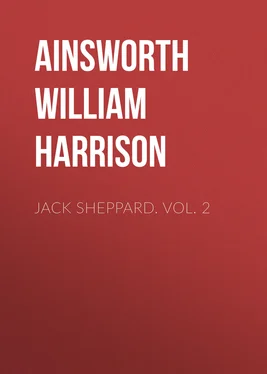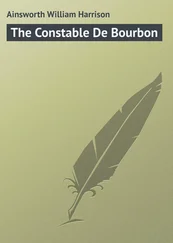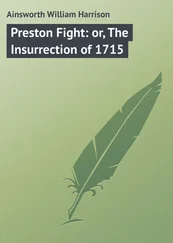William Ainsworth - Jack Sheppard. Vol. 2
Здесь есть возможность читать онлайн «William Ainsworth - Jack Sheppard. Vol. 2» — ознакомительный отрывок электронной книги совершенно бесплатно, а после прочтения отрывка купить полную версию. В некоторых случаях можно слушать аудио, скачать через торрент в формате fb2 и присутствует краткое содержание. Жанр: foreign_prose, literature_19, Европейская старинная литература, на английском языке. Описание произведения, (предисловие) а так же отзывы посетителей доступны на портале библиотеки ЛибКат.
- Название:Jack Sheppard. Vol. 2
- Автор:
- Жанр:
- Год:неизвестен
- ISBN:нет данных
- Рейтинг книги:3 / 5. Голосов: 1
-
Избранное:Добавить в избранное
- Отзывы:
-
Ваша оценка:
- 60
- 1
- 2
- 3
- 4
- 5
Jack Sheppard. Vol. 2: краткое содержание, описание и аннотация
Предлагаем к чтению аннотацию, описание, краткое содержание или предисловие (зависит от того, что написал сам автор книги «Jack Sheppard. Vol. 2»). Если вы не нашли необходимую информацию о книге — напишите в комментариях, мы постараемся отыскать её.
Jack Sheppard. Vol. 2 — читать онлайн ознакомительный отрывок
Ниже представлен текст книги, разбитый по страницам. Система сохранения места последней прочитанной страницы, позволяет с удобством читать онлайн бесплатно книгу «Jack Sheppard. Vol. 2», без необходимости каждый раз заново искать на чём Вы остановились. Поставьте закладку, и сможете в любой момент перейти на страницу, на которой закончили чтение.
Интервал:
Закладка:
“May be,” returned the man gravely.
“Take him home, Saunders,” said Sir Rowland, resigning his faulty steed to the attendant’s care, “I shall not require you further. Strange!” he added, as the groom departed; “Bay Stuart has carried me through a hundred dangers, but never played me such a trick before.”
“And never should again, were he mine,” rejoined Jonathan. “If the best nag ever foaled were to throw me in this unlucky spot, I’d blow his brains out.”
“What do you mean, Sir?” asked Trenchard.
“A fall against Newgate is accounted a sign of death by the halter,” replied Wild, with ill-disguised malignity.
“Tush!” exclaimed Sir Rowland, angrily.
“From that door,” continued the thief-taker, pointing to the gloomy portal of the prison opposite which they were standing, “the condemned are taken to Tyburn. It’s a bad omen to be thrown near that door.”
“I didn’t suspect you of so much superstition, Mr. Wild,” observed the knight, contemptuously.
“Facts convince the most incredulous,” answered Jonathan, drily. “I’ve known several cases where the ignominious doom I’ve mentioned has been foretold by such an accident as has just befallen you. There was Major Price—you must recollect him, Sir Rowland,—he stumbled as he was getting out of his chair at that very gate. Well, he was executed for murder. Then there was Tom Jarrot, the hackney-coachman, who was pitched off the box against yonder curbstone, and broke his leg. It was a pity he didn’t break his neck, for he was hanged within the year. Another instance was that of Toby Tanner—”
“No more of this,” interrupted Trenchard; “where is the boy?”
“Not far hence,” replied Wild. “After all our pains we were near losing him, Sir Rowland.”
“How so?” asked the other, distrustfully.
“You shall hear,” returned Jonathan. “With the help of his comrade, Jack Sheppard, the young rascal made a bold push to get out of the round-house, where my janizaries had lodged him, and would have succeeded too, if, by good luck,—for the devil never deserts so useful an agent as I am, Sir Rowland,—I hadn’t arrived in time to prevent him. As it was, my oldest and trustiest setter, Abraham Mendez, received a blow on the head from one of the lads that will deprive me of his services for a week to come,—if, indeed it does not disable him altogether. However, if I’ve lost one servant, I’ve gained another, that’s one comfort. Jack Sheppard is now wholly in my hands.”
“What is this to me, Sir?” said Trenchard, cutting him short.
“Nothing whatever,” rejoined the thief-taker, coldly. “But it is much to me. Jack Sheppard is to me what Thames Darrell is to you—an object of hatred. I owed his father a grudge: that I settled long ago. I owe his mother one, and will repay the debt, with interest, to her son. I could make away with him at once, as you are about to make away with your nephew, Sir Rowland,—but that wouldn’t serve my turn. To be complete, my vengeance must be tardy. Certain of my prey, I can afford to wait for it. Besides, revenge is sweetened by delay; and I indulge too freely in the passion to rob it of any of its zest. I’ve watched this lad—this Sheppard—from infancy; and, though I have apparently concerned myself little about him, I have never lost sight of my purpose. I have suffered him to be brought up decently—honestly; because I would make his fall the greater, and deepen the wound I meant to inflict upon his mother. From this night I shall pursue a different course; from this night his ruin may be dated. He is in the care of those who will not leave the task assigned to them—the utter perversion of his principles—half-finished. And when I have steeped him to the lips in vice and depravity; when I have led him to the commission of every crime; when there is neither retreat nor advance for him; when he has plundered his benefactor, and broken the heart of his mother—then—but not till then, I will consign him to the fate to which I consigned his father. This I have sworn to do—this I will do.”
“Not unless your skull’s bullet-proof,” cried a voice at his elbow; and, as the words were uttered, a pistol was snapped at his head, which,—fortunately or unfortunately, as the reader pleases,—only burnt the priming. The blaze, however, was sufficient to reveal to the thief-taker the features of his intended assassin. They were those of the Irish watchman.
“Ah! Terry O’Flaherty!” vociferated Jonathan, in a tone that betrayed hot the slightest discomposure. “Ah! Terry O’Flaherty!” he cried, shouting after the Irishman, who took to his heels as soon as he found his murderous attempt unsuccessful; “you may run, but you’ll not get out of my reach. I’ll put a brace of dogs on your track, who’ll soon hunt you down. You shall swing for this after next sessions, or my name’s not Jonathan Wild. I told you, Sir Rowland,” he added, turning to the knight, and chuckling, “the devil never deserts me.”
“Conduct me to your dwelling, Sir, without further delay,” said Trenchard, sternly,—“to the boy.”
“The boy’s not at my house,” replied Wild.
“Where is he, then?” demanded the other, hastily.
“At a place we call the Dark House at Queenhithe,” answered Jonathan, “a sort of under-ground tavern or night-cellar, close to the river-side, and frequented by the crew of the Dutch skipper, to whose care he’s to be committed. You need have no apprehensions about him, Sir Rowland. He’s safe enough now. I left him in charge of Quilt Arnold and Rykhart Van Galgebrok—the skipper I spoke of—with strict orders to shoot him if he made any further attempt at escape; and they’re not lads—the latter especially—to be trifled with. I deemed it more prudent to send him to the Dark House than to bring him here, in case of any search after him by his adoptive father—the carpenter Wood. If you choose, you can see him put on board the Zeeslang yourself, Sir Rowland. But, perhaps, you’ll first accompany me to my dwelling for a moment, that we may arrange our accounts before we start. I’ve a few necessary directions to leave with my people, to put ‘em on their guard against the chance of a surprise. Suffer me to precede you. This way, Sir Rowland.”
The thief-taker’s residence was a large dismal-looking, habitation, separated from the street by a flagged court-yard, and defended from general approach by an iron railing. Even in the daylight, it had a sombre and suspicious air, and seemed to slink back from the adjoining houses, as if afraid of their society. In the obscurity in which it was now seen, it looked like a prison, and, indeed, it was Jonathan’s fancy to make it resemble one as much as possible. The windows were grated, the doors barred; each room had the name as well as the appearance of a cell; and the very porter who stood at the gate, habited like a jailer, with his huge bunch of keys at his girdle, his forbidding countenance and surly demeanour seemed to be borrowed from Newgate. The clanking of chains, the grating of locks, and the rumbling of bolts must have been music in Jonathan’s ears, so much pains did he take to subject himself to such sounds. The scanty furniture of the rooms corresponded with their dungeon-like aspect. The walls were bare, and painted in stone-colour; the floors, devoid of carpet; the beds, of hangings; the windows, of blinds; and, excepting in the thief-taker’s own audience-chamber, there was not a chair or a table about the premises; the place of these conveniences being elsewhere supplied by benches, and deal-boards laid across joint-stools. Great stone staircases leading no one knew whither, and long gloomy passages, impressed the occasional visitor with the idea that he was traversing a building of vast extent; and, though this was not the case in reality, the deception was so cleverly contrived that it seldom failed of producing the intended effect. Scarcely any one entered Mr. Wild’s dwelling without apprehension, or quitted it without satisfaction. More strange stories were told of it than of any other house in London. The garrets were said to be tenanted by coiners, and artists employed in altering watches and jewelry; the cellars to be used as a magazine for stolen goods. By some it was affirmed that a subterranean communication existed between the thief-taker’s abode and Newgate, by means of which he was enabled to maintain a secret correspondence with the imprisoned felons: by others, that an under-ground passage led to extensive vaults, where such malefactors as he chose to screen from justice might lie concealed till the danger was blown over. Nothing, in short, was too extravagant to be related of it; and Jonathan, who delighted in investing himself and his residence with mystery, encouraged, and perhaps originated, these marvellous tales. However this may be, such was the ill report of the place that few passed along the Old Bailey without bestowing a glance of fearful curiosity at its dingy walls, and wondering what was going on inside them; while fewer still, of those who paused at the door, read, without some internal trepidation, the formidable name—inscribed in large letters on its bright brass-plate—of JONATHAN WILD.
Читать дальшеИнтервал:
Закладка:
Похожие книги на «Jack Sheppard. Vol. 2»
Представляем Вашему вниманию похожие книги на «Jack Sheppard. Vol. 2» списком для выбора. Мы отобрали схожую по названию и смыслу литературу в надежде предоставить читателям больше вариантов отыскать новые, интересные, ещё непрочитанные произведения.
Обсуждение, отзывы о книге «Jack Sheppard. Vol. 2» и просто собственные мнения читателей. Оставьте ваши комментарии, напишите, что Вы думаете о произведении, его смысле или главных героях. Укажите что конкретно понравилось, а что нет, и почему Вы так считаете.












